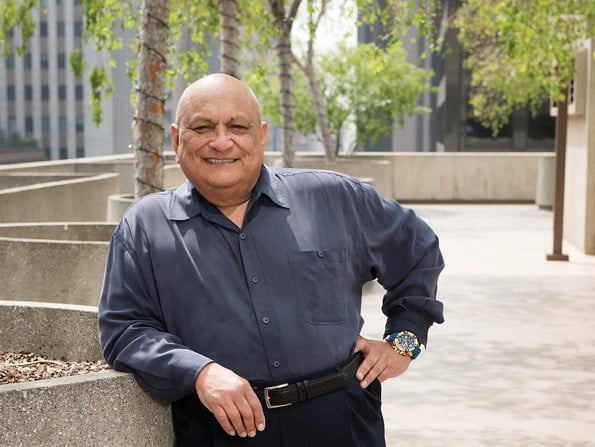
Daniel Garcia wanted to play college football, but the course of his life shifted when the United States Army came calling. Garcia found himself 8,000 miles from home serving as a platoon sergeant in Vietnam. After being wounded in combat, he left the military to get his master’s degree at the University of Southern California and attend law school. After making partner at Munger, Tolles and Olson, he started a career in public service, spending 20 years as a member and president of various municipal commissions. In 2002 he joined Kaiser Permanente’s board of directors, later becoming the nonprofit’s senior vice president and chief compliance and privacy officer. He walks us through the post-Affordable Care Act world from the perspective of one of the largest health care systems in the country.
What are you most excited about in the healthcare industry right now?
The Affordable Care Act (ACA) is extending the availability of health care to millions of Americans who don’t have it. We’ve signed up thousands of new members as a result. No law is perfect, but we’re committed to it, and it’s clearly making a difference. Under the ACA, there are lots of regulations, rules, laws, and other issues. The primary function of my job is to make sure we comply at all levels.
How dramatically has the ACA changed the industry?
It’s the most dramatic change to the US health care system in nearly 50 years, and that manifests itself in many ways. Relationships are changing, but of course, we still don’t know how the whole thing will play out.
Does it change the way you provide services?
It has to. The ACA encourages better care delivery. In the old days, you went to the doctor and he/she referred you to someone you’d never met before and would refer you to a random hospital. At each step, you would have to explain your whole history to a new person. The ACA incentivizes health care professionals to be more efficient and care for patients as part of a team.
How has that been implemented at Kaiser?
Kaiser was the first to establish a comprehensive, electronic medical record system. It covers 9.2 million patients. If you’re on vacation and get hurt, for example, your records can be accessed electronically and instantly. Medical professionals anywhere will have all the data they need to treat you. It is so important that access to your medical records doesn’t rely on your memory or another person’s knowledge of you. That is just not sustainable. Here at Kaiser, we can also engage the data—following the appropriate protocols—to, for instance, pull out data on every Hispanic male over age 65 and see what percentage of that group lives with diabetes. This helps with prevention.
Are there privacy concerns?
Of course. And I am responsible for ensuring that we address those concerns. We’re spending a lot of time and money to make sure the right people, and only those people, have access to records at the right time.
Are there other key ways you’ve increased efficiencies?
Health care costs continue to rise and all health plans are under pressure to make coverage more affordable. Our physicians are partners here, so we can match our resources and facilities with skills and capitalize on our highly organized group of doctors.
How is the expansion of Medicaid under the ACA impacting Kaiser?
There’s a wide variance in how states deal with Medicaid, especially in reimbursement. We’re about to see a significant increase in Medicaid across the eight states in which we operate. We’re getting hundreds of thousands of enrollees. This influx is unprecedented. We’re working aggressively to make it work.
How will you do it?
We have an excellent interface with members and good interaction with providers. We’re improving response time and lowering costs. We’re also harnessing technology in other ways. Patients can Skype doctors or send photos to get faster diagnoses without even coming into a facility.
It sounds like you’ve adapted your business model quite a bit.
We’re not just managing treatments, we’re managing patients. We have our own facilities, so we’re now integrating treatment to be more self-sufficient. This way we can control costs. We’re also changing care models and building more ambulatory care centers so patients can come and go without a hospital stay, when medically appropriate.
Are these new regulations and the increased access to insurance good or bad for the company?
Greater access to health care is always a good thing. The regulations are generally neutral. We’re doing the best we can to adopt these changes that involve thousands of employees and rules that continue to evolve. The trick is to carefully and accurately track everything, which is something we do well.
Do you see any problems on the horizon?
One of the big threats in the industry is that lots of big employers want to get out of providing insurance in the group model. They’d rather give a fixed sum of money or a voucher. But changing from a group to a retail model where individuals choose their own carrier creates a whole new world of challenges. It conjures up the need for better information about providers and more competitive pricing. This is information the public has never really had access to. I don’t know if it’s good or bad, but it’s different. If it happens, it will change the industry even more.
What has the implementation of health care exchanges done for Kaiser’s bottom line?
Membership is obviously up. We have competitive products, and we are competitively priced on the exchanges. We’ve invested in upgrades to our facilities, so we’ve been very prepared for this. We’re a nonprofit, so we don’t have shareholders. Any money that comes in as a result goes right back into better care facilities and better technology.
How do you expect the industry to change in the next few years?
You can only survive this by investing in technology and facilities. That means we’ll see a lot of mergers and acquisitions because the little guys just can’t make it. I think we’ll also see price competition grow even more ferocious. I oversee 500 people, and I tell everyone I interview or meet the same thing: I have no idea what they’ll be doing in a year, but I know it won’t be boring.

